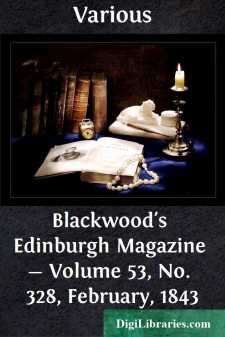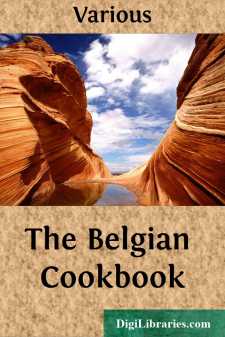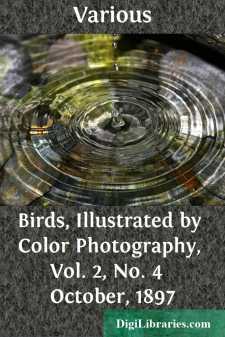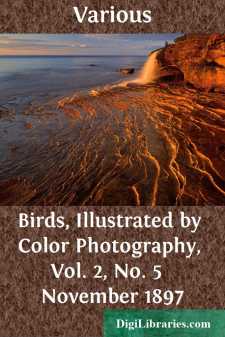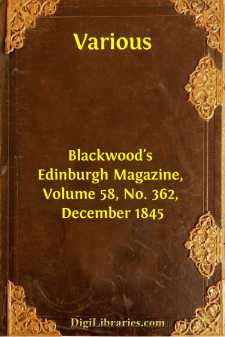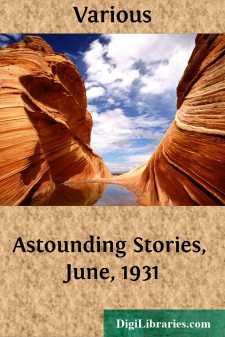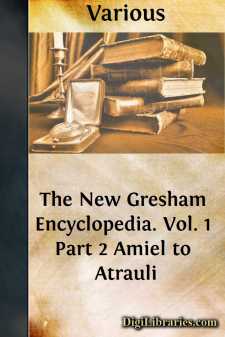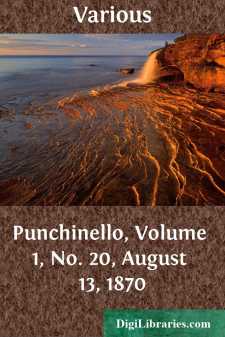Categories
- Antiques & Collectibles 13
- Architecture 36
- Art 48
- Bibles 22
- Biography & Autobiography 813
- Body, Mind & Spirit 138
- Business & Economics 28
- Children's Books 12
- Children's Fiction 9
- Computers 4
- Cooking 94
- Crafts & Hobbies 4
- Drama 346
- Education 46
- Family & Relationships 57
- Fiction 11821
- Games 19
- Gardening 17
- Health & Fitness 34
- History 1377
- House & Home 1
- Humor 147
- Juvenile Fiction 1873
- Juvenile Nonfiction 202
- Language Arts & Disciplines 88
- Law 16
- Literary Collections 686
- Literary Criticism 179
- Mathematics 13
- Medical 41
- Music 40
- Nature 179
- Non-Classifiable 1768
- Performing Arts 7
- Periodicals 1453
- Philosophy 64
- Photography 2
- Poetry 896
- Political Science 203
- Psychology 42
- Reference 154
- Religion 505
- Science 126
- Self-Help 81
- Social Science 81
- Sports & Recreation 34
- Study Aids 3
- Technology & Engineering 59
- Transportation 23
- Travel 463
- True Crime 29
Blackwood's Edinburgh Magazine - Volume 53, No. 328, February, 1843
by: Various
Description:
Excerpt
ARNOLD'S LECTURES ON HISTORY.
If any doubt could exist as to the nature of the loss which the premature death of Dr Arnold has inflicted on the literature of his country, the perusal of the volume before us must be sufficient to show how great, how serious, nay, all circumstances taken together, we had almost said how irreparable, it ought to be considered. Recently placed in a situation which gave his extraordinary faculties as a teacher still wider scope than they before possessed, at an age when the vivacity and energy of a commanding intellect were matured, not chilled, by constant observation and long experience—gifted with industry to collect, with sagacity to appreciate, with skill to arrange the materials of history—master of a vivid and attractive style for their communication and display—eminent, above all, for a degree of candour and sincerity which gave additional value to all his other endowments—what but leisure did Dr Arnold require to qualify him for a place among our most illustrious authors? Under his auspices, we might not unreasonably have hoped for works that would have rivalled those of the great continental writers in depth and variety of research; in which the light of original and contemporaneous documents would be steadily flung on the still unexplored portions of our history; and that Oxford would have balanced the fame of Schlösser and Thierry and Sismondi, by the labours of a writer peculiarly, and, as this volume proves, most affectionately her own.
The first Lecture in the present volume is full of striking and original remarks, delivered with a delightful simplicity; which, since genius has become rare among us, has almost disappeared from the conversation and writings of Englishmen. Open the pages of Herodotus, or Xenophon, or Cæsar, and how plain, how unpretending are the preambles to their immortal works—in what exquisite proportion does the edifice arise, without apparent effort, without ostentatious struggle, without, if the allusion may be allowed, the sound of the axe or hammer, till "the pile stands fixed her stately height" before us—the just admiration of succeeding ages! But our modern filosofastri insist upon stunning us with the noise of their machinery, and blinding us with the dust of their operations. They will not allow the smallest portion of their vulgar labours to escape our notice. They drag us through the chaos of sand and lime, and stone and bricks, which they have accumulated, hoping that the magnitude of the preparation may atone for the meanness of the performance. Very different from this is the style of Dr Arnold. We will endeavour to exhibit a just idea of his views, so far as they regard the true character of history, the manner in which it should be studied, and the events by which his theory is illustrated. To study history as it should be studied, much more to write history as it should be written, is a task which may dignify the most splendid abilities, and occupy the most extended life.
Lucian in one of his admirable treatises, ridicules those who imagine that any one who chooses may sit down and write history as easily as he would walk or sleep, or perform any other function of nature,
"Thought, to the man that never thinks, may seemAs natural as when asleep to dream."
From the remarks of this greatest of all satirists, it is manifest that, in his days, history had been employed, as it has in ours, for the purposes of slander and adulation....


